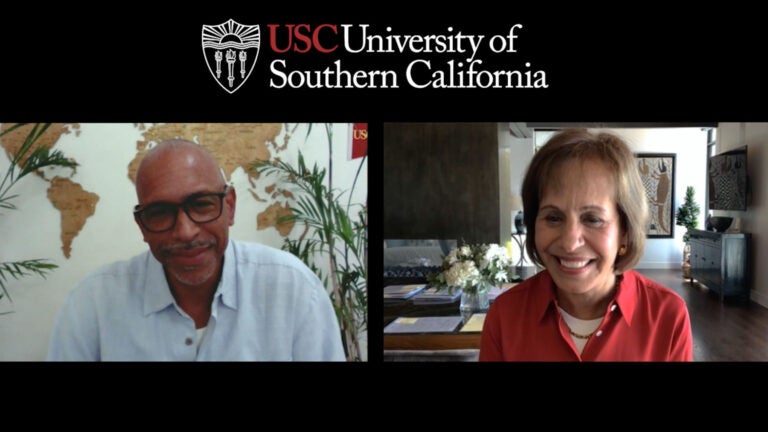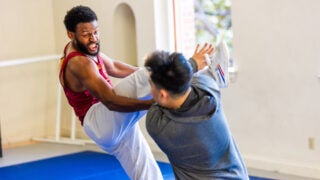
USC President Carol Folt talks with USC Rossier School of Education Dean Pedro Noguera.
As U.S. schools consider reopening, what can they learn from other countries?
In the first of a series of video conversations with USC leaders, President Carol L. Folt sits down with USC Rossier Dean Pedro Noguera. Find out about his advice for K-12 schools and their ideas on how educators can explain racial justice to students.
With the pandemic prompting many universities — including USC — to move most classes online this fall, and with school districts debating how and when to brings students back, education is a major topic from coast to coast. Pedro Noguera is glad the country sees the need for this conversation.
“It’s a difficult situation, and schools have not gotten a lot of guidance from either the state or the federal government during this period,” Noguera — the new dean of the USC Rossier School of Education — told President Carol L. Folt on Tuesday.
In the first video in the “We Are SC” series of presidential conversations with USC educators, Folt sat down with the dean to talk about the state of education during the pandemic and where we might be headed. Noguera took the reins as USC Rossier dean on July 1.
“Pedro is one of the nation’s leading voices is on education, and I am so excited to have the chance to talk about a topic that I know is at the top of mind of the national conversation today — the future of education, in particular — during the COVID pandemic,” Folt said.
Folt and Noguera examine how schools can reopen safely
Folt asked Noguera if the U.S. can look to other countries for guidance on reopening schools. He cited Denmark — which reopened with provisions including smaller class sizes, mandatory hand-washing and greater separation of desks — as a model example for how to reopen correctly. Other countries like Germany, Finland and Norway have followed similar measures and also avoided significant spikes in the number of new COVID-19 cases.
“We should be learning lessons from both: what seems to work in terms of best practices for opening schools and what we should avoid,” Noguera said. “That’s the good thing about our school schedule: We have the advantage of looking backward.”
Though Noguera said safety is obviously the primary concern for reopening schools, he also touched on the drawbacks of students — particularly young children — not returning to school, such as isolation or the lack of access to stable internet. High school students can also face similar issues, in addition to a sense of discouragement as they approach college age.
In a period like this, schools play such a vital role in providing support to families and communities.
Pedro Noguera
“We have to recognize that, in a period like this, schools play such a vital role in providing support to families and communities,” Noguera said. “I think that’s often underappreciated.”
Folt agreed with Noguera’s sentiments concerning students losing out on usual educational opportunities during this pandemic and empathized with what they’re going through during a time of so much uncertainty,
“Some of them are probably terrified,” she said. “There’s much going on in their lives that makes this so important.”
Noguera noted that USC Rossier is already a leader in distance learning and can provide guidance to students and educators on how to not only adapt to going fully online but also succeed.
“It’s not just listening to a teacher talk at them but how to make it interactive so that students have some engagement with their peers,” Noguera said. “It’s equally important that we help educators and parents address those social and emotional needs in kids who’ve been experiencing greater depression and anxiety as a result of the pandemic.”
The role of educators in exploring and explaining racial justice
The conversation eventually shifted to whether schools can play a role in racial justice. Noguera simply responded, “they have to.”
“I don’t know any other institution that can or is as well-positioned,” he said.
In Noguera’s words, learning about our country’s actual history has a tendency to trouble people because it often is at odds with what we were taught. But the questions students are asking today are crucial to a civil debate and the sharing of different perspectives. Students are then are able to make informed decisions and come to well-thought-out positions.
“This movement for racial justice, it’s going to come to our schools, and my hope is our schools are ready for the children because the children have been watching,” Noguera said. “They’ve been seeing what’s going on around them; they’ve been hearing about the protests, and they’re going to come with questions. Our schools have to be ready for those questions.”
Folt asked Noguera if he had any advice for those interested in pursuing education, especially the next generation of educators.
“I wish I could tell them that you will earn a good living, and you’ll be able to support your family,” he said. “Unfortunately, in many of our big cities, that’s not the case.”
But he also spoke passionately about the rewards of truly making a difference and the vital role educators play.
“We need people with intelligence and passion to go into this profession,” Noguera said. “It is one of the few professions where you can genuinely say, ‘I’m making a difference by what I do each and every day.’”



